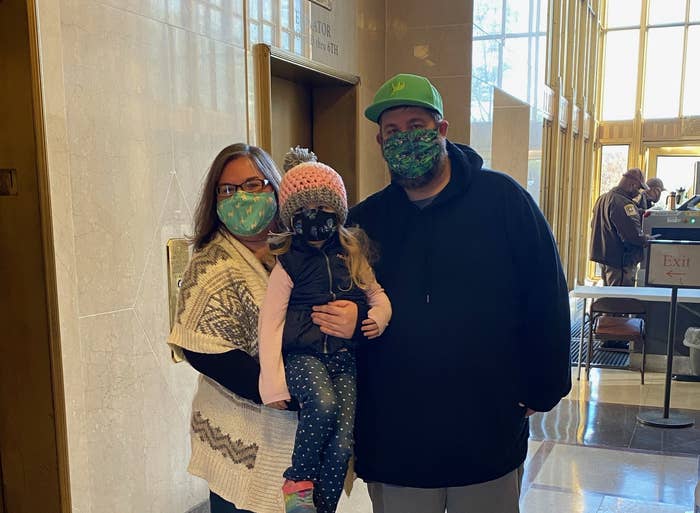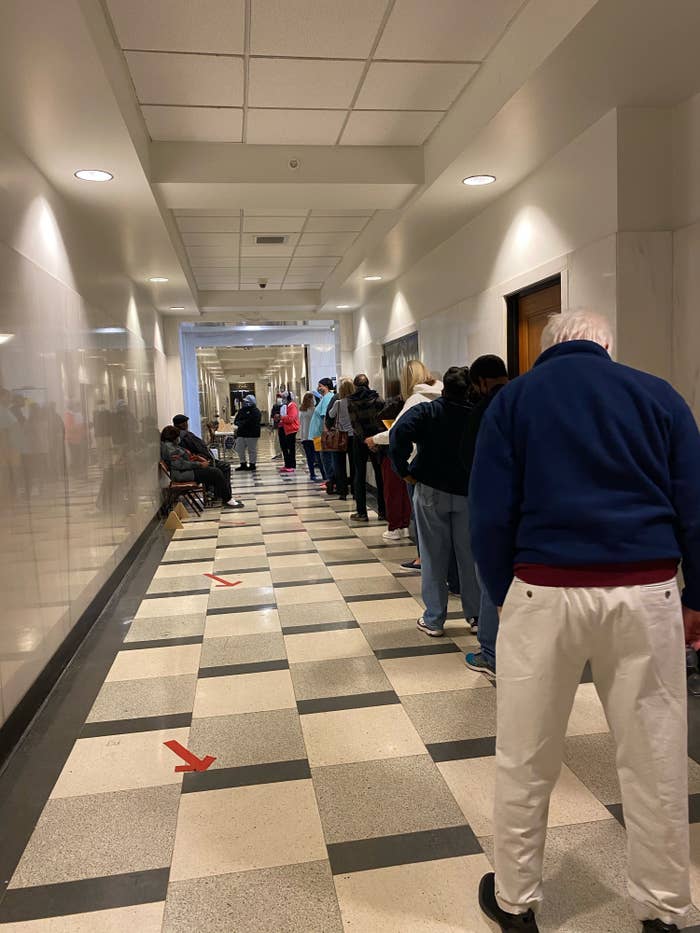
WASHINGTON — Kristina Canfield arrived at the Jefferson County courthouse in Birmingham, Alabama, at around 7:30 a.m. on Monday. She sat in the car with her husband and 5-year-old daughter for about 15 minutes to stay warm — the temperature was in the 30s, she said — until the court began letting people inside.
Canfield and her husband, Brandon, were there to make sure the absentee ballots they’d put in the mail two weeks ago were counted. A federal court had invalidated special instructions that they received from county officials for voting by mail, and they only learned that their ballots were at risk of being rejected from a BuzzFeed News report. Over the weekend, they learned from the county that they needed to go in person to save their votes.
Standing indoors in close proximity to other people was exactly the scenario they wanted to avoid and why they’d applied for absentee ballots this year, Canfield told BuzzFeed News in a phone interview. She said she and her husband have underlying medical conditions that put them at higher risk if they contract COVID-19; they brought their daughter to the courthouse because they’ve been keeping her home from school during the pandemic to avoid further exposure.
“We took all of these precautions. [There’s] this frustration of, we’re going to have to go up there, there’s no way around it,” Canfield said. “Everything we’ve done, it feels like it doesn’t even matter. Everything we were trying to avoid, we were forced to face today.”
The Canfields are among an as-yet-unconfirmed number of absentee voters in Jefferson County — the most populous county in Alabama — who relied on special ballot instructions from county officials that a federal appeals court later invalidated. Jefferson County election officials haven’t responded to questions from BuzzFeed News over the past week about how many voters might be at risk of having their ballots rejected, and Jackie Anderson-Smith, the official in charge of absentee voting in Jefferson County, did not respond to multiple requests for comment on Monday about the process that the Canfields went through.
BuzzFeed News has journalists around the US bringing you trustworthy stories on the 2020 Elections. To help keep this news free, become a member.
Canfield said that by the time she and her family left the courthouse at around 8:30 a.m., she had counted approximately 75 people waiting in line.
The issue in Jefferson County stems from a state law that requires absentee voters to have a notary or two witnesses sign their ballots. A federal judge on Sept. 30 lifted that rule during the pandemic for voters with medical conditions, and Jefferson County sent out waiver forms that voters could sign to take advantage of the judge’s order.

The waiver didn’t alert voters that Alabama Secretary of State John Merrill had immediately appealed the judge’s September order. On Oct. 13, the US Court of Appeals for the 11th Circuit reversed the judge and reinstated the witness rule; ballots postmarked on or after Oct. 14 wouldn’t count if they failed to comply with state law, regardless of what instructions voters received from Jefferson County.
Canfield, a 37-year-old program coordinator at a local university, told BuzzFeed News that she and her husband received their absentee ballot materials on Oct. 13. They signed the witness waiver forms and put their ballots in the mail on Oct. 14; they both voted for former vice president Joe Biden, she said. She said she didn’t know about the 11th Circuit ruling at the time. Jefferson County had posted a press release on its website about the appeals court order but didn’t also notify voters who had received the waiver with their absentee ballot materials that they could no longer use it.
On Oct. 21, voting rights groups that had sued Alabama over the witness rule and other voting restrictions during the pandemic sent a letter to Jefferson County election officials expressing concern that the county hadn’t taken steps to notify voters who sent in the waiver after Oct. 13 that their votes might be rejected, and asked that those voters be given a way to save their ballots.
On Oct. 24, BuzzFeed News published a report about the waiver issue in Jefferson County. Canfield said that story was the first she learned that the ballots that she and her husband had already mailed in might be in trouble.
On Oct. 26, the county published a press release on its website and across several social media platforms alerting voters who had mailed in the waiver on or after Oct. 14 to contact the election office. Canfield said she began calling that day, and when she finally got a county employee on the phone two days later, she was told that she only needed to verify her identity over the phone to preserve her ballot.
Canfield said she was surprised to get a phone call on Oct. 31 from a county employee saying that she and her husband did, in fact, need to satisfy the witness requirement and would need to come in person to the courthouse on Monday to do that. She said they learned that the only other option to vote would be to go to their polling place on Election Day to cast a provisional ballot.
“My immediate reaction was, ‘Seriously?’ Especially since we had done what we were asked to do before,” Canfield said. “Before we got the phone call Saturday, we were thinking, ‘OK, it’s taken care of, it’s not a big deal.’ And then just frustration. And not just for myself, but for everyone.”
If you have a news tip, we’d like to hear from you. Reach out to us via one of our tip line channels.
Grace Newcombe, a spokesperson for Merrill’s office, said the secretary of state hadn’t received information from Jefferson County about how many voters might be affected. Newcombe provided a copy of a letter that a county probate judge, James Naftel II, sent to Merrill on Oct. 27 asking for guidance about how the county should handle ballots that had arrived after Oct. 13 with the witness waiver, a sign that the county was still trying to figure out a plan after it had posted the notice to voters on its website.
Naftel’s letter raised another concern about the waivers, which is that it might not be clear to county officials if some absentee ballots contained a waiver at all. Absentee voters in the state return three envelopes — one is a secrecy envelope that contains their ballot, which goes inside a second envelope that gets the witness signature, which goes inside the final envelope that gets put in the mail. If the waiver wasn’t included outside of the second envelope, Merrill’s office told Naftel that the county couldn’t open the two internal envelopes in the off chance that a waiver might be in there; Alabama is one of several states that does not start going through and counting mail-in votes until Election Day. Naftel referred a request for comment on Monday to Smith.
Canfield said that everyone she saw waiting to take care of their absentee ballots at the courthouse on Monday morning was wearing a mask, but it was difficult to maintain social distancing inside. She said some voters were also showing up to drop off their ballots, and there was confusion about where people were supposed to go.
“Someone was trying to control traffic, people were upset, they didn’t want to be there, you could feel that tension. People were mad,” she said.
Canfield said she thought county employees “were doing the best they could with the mess they were handed,” but when she left she wasn’t fully convinced that her vote would be counted in the end.
“It’s just hard to have confidence in the system, and I hate that because I’ve never felt that before,” she said.

